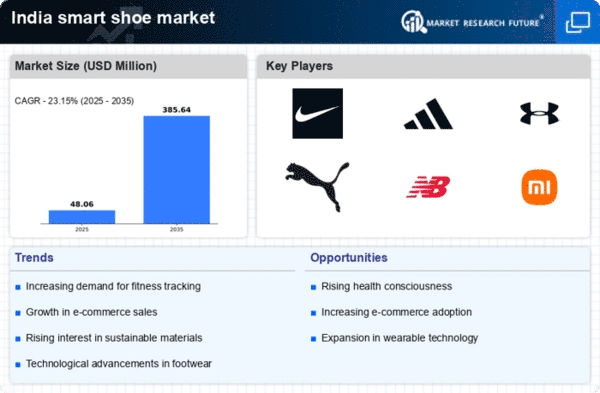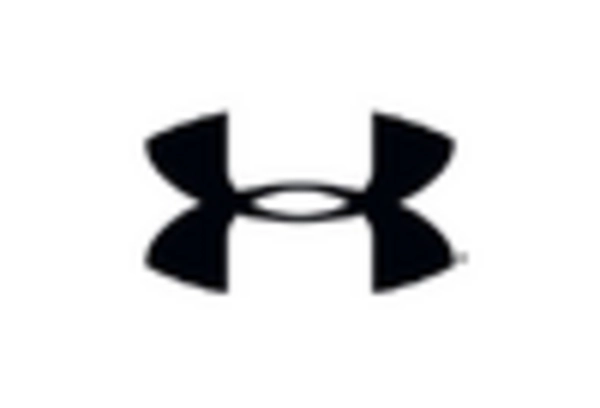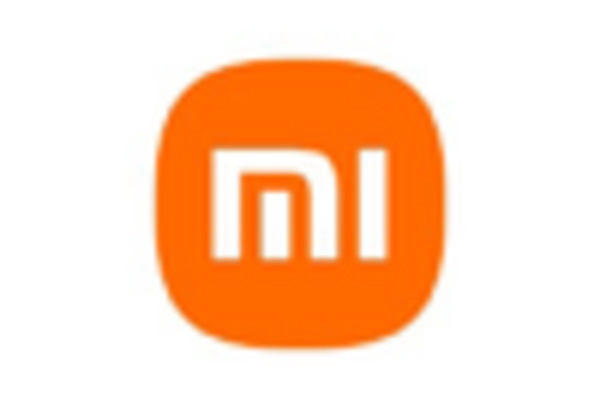Increased Disposable Income
The rise in disposable income among the Indian middle class is a significant driver for the smart shoe market. As consumers have more financial resources, they are willing to invest in premium products that offer advanced features and benefits. The smart shoe market is likely to benefit from this trend, as consumers increasingly view smart footwear as a valuable investment in their health and lifestyle. Reports indicate that the middle-class population in India is expected to grow to 600 million by 2030, which could lead to a substantial increase in demand for smart shoes, thereby enhancing market dynamics.
Rising Health Consciousness
The increasing awareness of health and fitness among the Indian population is a pivotal driver for the smart shoe market. As more individuals prioritize physical well-being, the demand for footwear that integrates health monitoring features is surging. Smart shoes equipped with sensors that track steps, calories burned, and even heart rate are becoming increasingly popular. According to recent estimates, the fitness tracking segment in India is projected to grow at a CAGR of 25% over the next five years. This trend indicates a robust market potential for smart shoes that cater to health-conscious consumers, thereby driving innovation and investment in the smart shoe market.
Growing E-commerce Platforms
The expansion of e-commerce platforms in India is facilitating access to the smart shoe market. With the rise of online shopping, consumers are more inclined to explore and purchase innovative footwear options from the comfort of their homes. E-commerce platforms provide a wide range of smart shoe options, often at competitive prices, which appeals to tech-savvy consumers. The online retail market in India is projected to reach $200 billion by 2026, indicating a favorable environment for smart shoe brands to thrive. This trend suggests that the smart shoe market will continue to grow as more consumers turn to online channels for their footwear needs.
Urbanization and Lifestyle Changes
Urbanization in India is reshaping lifestyles and consumer preferences, thereby impacting the smart shoe market. As more people migrate to urban areas, there is a noticeable shift towards active lifestyles, with an emphasis on fitness and mobility. This demographic is increasingly seeking footwear that not only provides comfort but also incorporates smart technology. The urban population is expected to reach 600 million by 2031, creating a substantial market for smart shoes that cater to the needs of city dwellers. This trend suggests a growing opportunity for brands to innovate and market smart shoes tailored to urban lifestyles.
Technological Advancements in Footwear
The rapid evolution of technology is significantly influencing the smart shoe market. Innovations such as Bluetooth connectivity, GPS tracking, and advanced materials are enhancing the functionality of smart shoes. These advancements not only improve user experience but also attract tech-savvy consumers. The integration of artificial intelligence in smart shoes allows for personalized fitness recommendations, which is appealing to a growing demographic of fitness enthusiasts. As technology continues to advance, the smart shoe market is likely to witness an influx of new features and capabilities, further stimulating consumer interest and market growth.
















